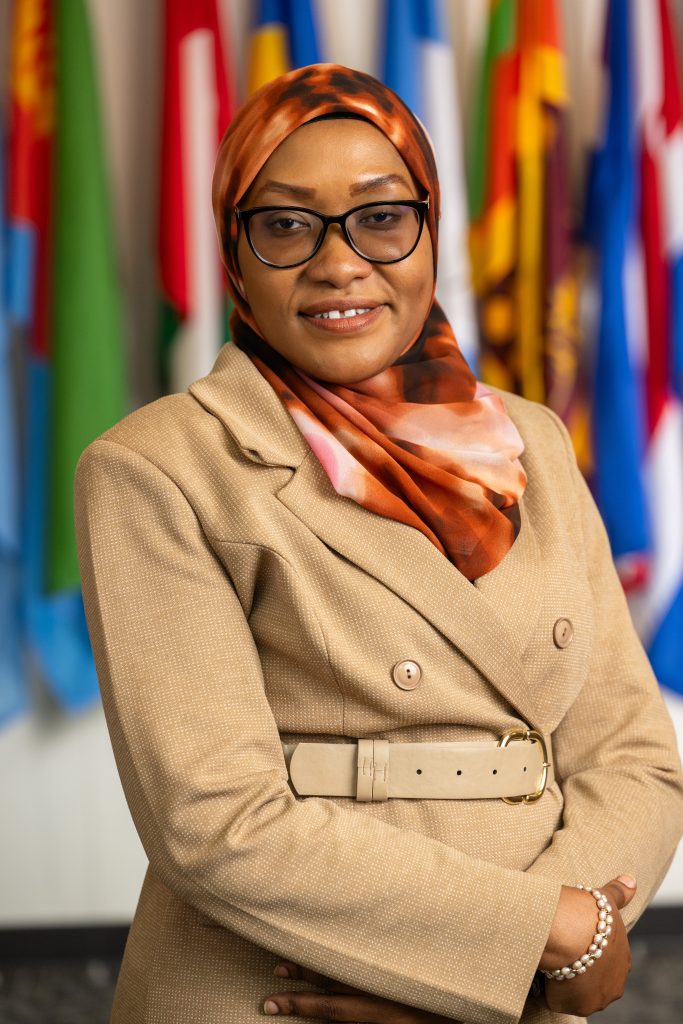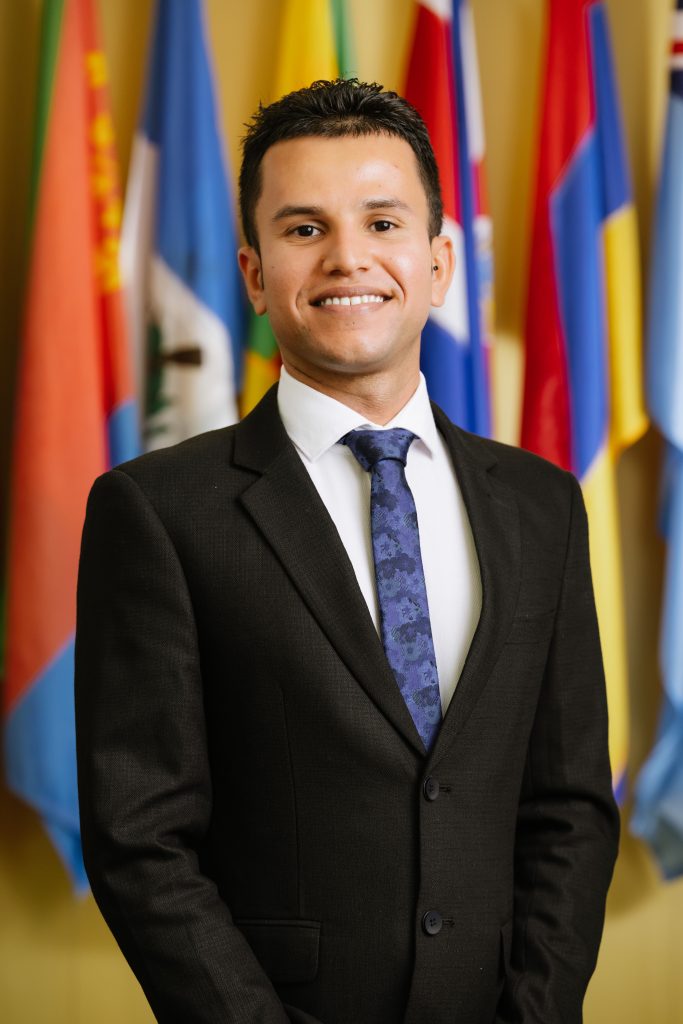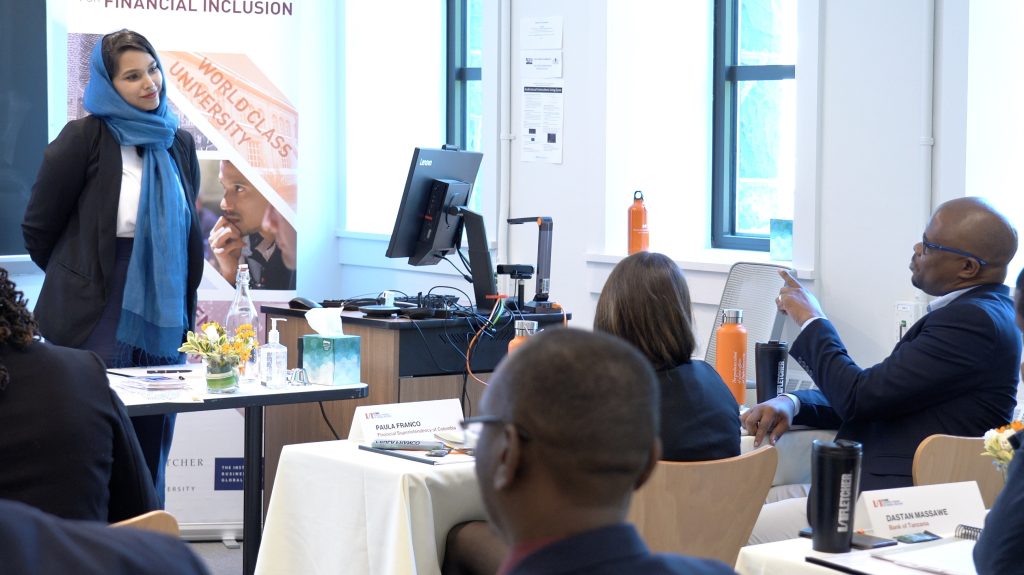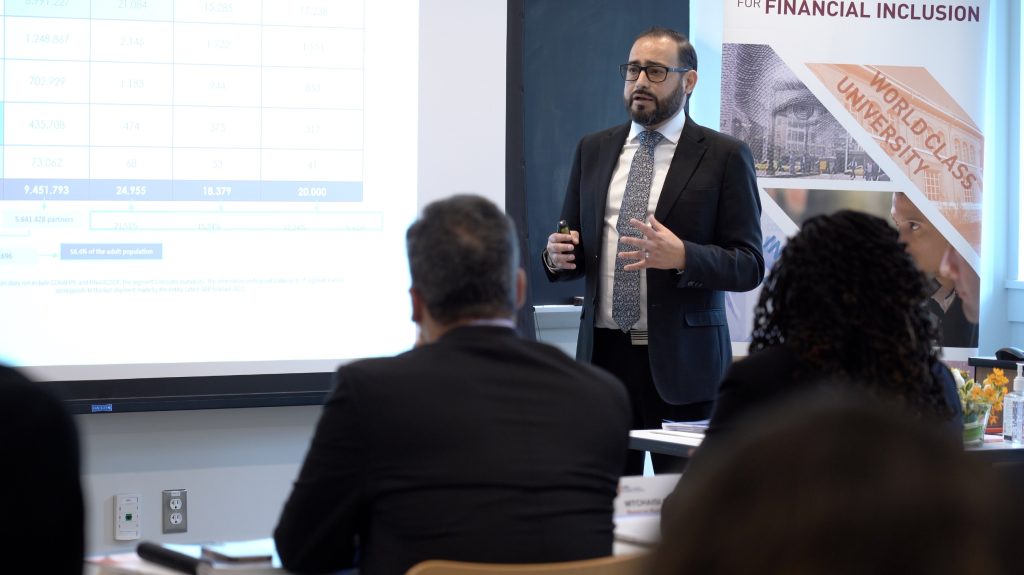Fellow Spotlights
Supporting Rural Women Entrepreneurs in Georgia

Photo credit: Mike Ritter for Tufts University
Ketevan Akhalkatsi and Salome Chikviladze, FLPFI 2025 alumni and a mentor–mentee pair from the National Bank of Georgia (NBG), shared insights on the impact of their policy memo, Enhancing Access to Finance for Rural Women Entrepreneurs in Georgia, in Georgia. Reflecting on the development process of this policy, they noted that one of the core challenges identified was the absence of an official definition of women-owned and women-led MSMEs in Georgia, which significantly limited the scope for evidence-based policymaking.
They reported that, through close cooperation with relevant NBG departments and key stakeholders, the policy work has since translated into practice. In collaboration with the Investors Council, the Banking Association, and commercial banks, the NBG has introduced an official definition of women-owned and women-led MSMEs, along with a standardized gender-disaggregated reporting framework. This framework has been integrated into NBG’s regulatory reporting system and incorporated into its regular Financial Stability Report (Box 3: Gender-Disaggregated MSME Financing Insights)
They also expressed appreciation to FLPFI, stating, “We wanted to thank FLPFI for the mentorship, analytical tools, and network that helped shape this work and continue to influence our professional paths.”
New Oversight Framework for Tanzania’s Microfinance Sector

Khadijah J. Kishimba, PhD
Acting Head Financial Consumer Protection
Bank of Tanzania
We are delighted to share a major milestone achieved by Khadijah J. Kishimba, PhD, a 2024 FLPFI alumna. The Bank of Tanzania has recently launched the policy solution she developed during her fellowship, a step in enhancing good market practices in the Tier 2 microfinance institutions in Tanzania.
On July 1, 2025, the Bank of Tanzania (BoT), in collaboration with the Tanzania Association of Microfinance Institutions (TAMFI) and the Tanzania Microfinance Union (TAMIU), signed a Memorandum of Understanding (MoU) to implement an industry self-regulatory approach. This approach will cover more than 2,600 Tier 2 Microfinance institutions licensed and regulated by the Bank under the Microfinance (Non-Deposit Taking Microfinance Service Providers) Regulations, 2019. This new approach, a cornerstone of the Khadijah’s policy pitch, complements existing supervisory and financial consumer protection efforts by leveraging established networks and broadening the scope from advocacy to enhance good market practices in the sub sector through a code of conduct guide and memorandum of understanding.
During the MoU signing event in Dar es Salaam, BoT Governor Emmanuel Tutuba emphasized the importance of the new regulatory approach in enhancing the supervisory and consumer protection environment in the microfinance sub sector. Under the agreement, TAMFI and TAMIU will, through a guided code of conduct undertake the responsibility of monitoring their member institutions, enforcing ethical standards and resolving consumer complaints. Governor Tutuba also issued a strong directive that all Tier 2 institutions will be required to join one of the Associations within six months to December 2025. This initiative addresses critical challenges in the sub- sector, such as increased market malpractices, growing number of players, low financial literacy and unsustainable borrowing practices, while reinforcing the essential role that microfinance Tier 2 play in supporting financial inclusion across Tanzania.
Our alumna attributes the success of this initiative in part to the insights, support, and collaborative spirit fostered during the 2024 FLPFI program. With implementation scheduled to begin in July 2025, she extends heartfelt gratitude to her cohort and mentors for helping turn this vision into reality. Her leadership exemplifies the impact FLPFI alumni continue to have on shaping inclusive financial policy and expanding access to finance in emerging markets.
Developing Climate Finance Policy in Seychelles

Cyril Benoiton
Senior Surveillance Analyst
Central Bank of Seychelles
Cyril Benoiton, a 2023 FLPFI fellow from the Central Bank of Seychelles, is playing a key role in shaping climate policy in collaboration with stakeholders and contributing to the formulation of the National Roadmap on Climate-related Financial Risks. These efforts are part of the execution of his policy solution that he developed during his FLPFI fellowship.
While the roadmap development is still in progress, several important steps have been already taken. These include drafting guidelines on the effective management of climate related financial risks, disclosure and reporting on climate related risks for the banking sector, as well as a concept note on the Central Bank’s climate related risk supervision strategy. The cabinet of Seychelles has also approved official national definitions for Sustainable, Climate, and Blue and Green Finance, which is a crucial step in advancing climate finance in the country.
Additionally, Cyril has held in-person workshops and online courses for staff of the Central Bank and financial institutions, supporting the revision of SME financing schemes in including climate related credit facilities. He is also working with line ministries to renew the Seychelles Renewable Energy and Energy Efficiency Program. Moreover, through cross-sectoral engagement, including active participation in the National Climate Change Technical Working Group and contributing to the 2025–2030 Climate Finance Resource Mobilization Strategy, his work is enhancing access to green finance solutions for MSMEs as well as is supporting the Seychelles broader economic and climate goals.
Talibzoda Firdavs appointed as the Chairman-National Bank of Tajikistan

Chariman-National Bank of Tajikstan
A distinguished alumnus of FLPFI from Tajikistan was appointed as the Chairman of the National Bank of Tajikistan. Mr. Tolibzoda Firdavs started his career at the National Bank in 2003 with the licensing division of the banking supervision department. He rose through the ranks to become the Leading Economist of Banking Supervision and more recently, as the Deputy Director of Banking Supervision at the National Bank of Tajikistan. Mr. Firdavs shares that “in this path FLPFI has its own place”. FLPFI wishes to congratulate Mr. Tolibzoda Firdavs and wish him the best in his new role.
Habibur Rahman appointed as the Deputy Governor of Bangladesh Bank

Deputy Governor – Bangladesh Bank
Another distinguished alumnus of FLPFI from Bangladesh was recently appointed as the deputy governor of the Bank of Bangladesh. Habibur Rahman is a 2013 fellow of the program whose policy idea for his fellowship with FLPFI involved examining the problems associated with the unbanked in Bangladesh. Dr. Rahman shares that “I’m excited for the next chapter in my journey as a financial inclusion champion and I feel proud to be part of the FLPFI community that has supported me along the way”. Prior to his new appointment, Mr. Rahman was the Chief Economist of the Bank and will now serve as the Deputy Governor for a period of three years. FLPFI wishes to congratulate Mr. Habibur Rahman and wish him the best in his new role.

Faiqa Naseem, 2018 FLPFI alum, shared her experience with the FLPFI 2023 fellows, describing how she applied the 8QM method in drafting the “Banking on Equality Policy for the State Bank of Pakistan”, launched in 2021. This was the first gender mainstreaming policy in Pakistan. The published policy document included a master circular containing detailed regulatory instructions, setting the headline targets for closing the gender gap in finance. The initiative paved the way for embedding a gender lens in the policies and practices of Pakistan’s financial sector. As a result, the gender gap in financial inclusion narrowed by 3%, decreasing from 38% in 2021 to 35% in 2022.

Similarly, Jorge Moncayo, 2020 FLPFI alum, shared his experience of applying the 8QM method in addressing the existing gender gap in financial inclusion in Ecuador, with the FLPFI 2023 cohort. Jorge and his team worked on a policy solution called “Regulation for the Projection of Financial Users with a Gender Perspective”, to address the gender gap in the accessing and using financial services and products. Their efforts aimed to promote access to financial education, as well as design and offer products with a gender perspective in Ecuador.
FLPFI Alumni are a very accomplished group of individuals working at Central Banks, Financial Regulation Agencies, or public and international agencies related to the promotion of financial inclusion in over 55 countries around the globe.

Vice Governor-Corporate Service National Bank of Ethiopia
Eyob began the fellowship concerned that Ethiopians under 30 years old make up over 70% of the population and 22% of this age group was facing unemployment in 2018. What shocked him most was that this segment of the population was technologically savvy and had access to mobile phones but was not taking advantage of digital financial services. Moreover, according to World Bank data, only 1% of Ethiopians used mobile phones to access accounts and only 9% had made or received digital payments. Seeing this as a missed opportunity, Eyob used the fellowship to design a policy that would develop a regulatory sandbox, so that innovative financial services that rely heavily on technology could be offered to tech-savvy financially excluded young adults, while preserving the oversight capacity of NBE.
Ethiopian regulation has since changed, favoring the promotion of DFS, allowing non-traditional financial actors to join the market. In fact, due to Eyob and other FLPFI alumni’s efforts, since 2020 telecom operators are allowed to provide mobile money alternatives in the country. While digital financial services consolidate, Eyob is already thinking ahead, focusing on how to make sure that the introduction of new actors leads to more access to formal financial services for Ethiopians under 30 years old.
